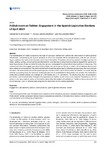Mostrar o rexistro simple do ítem
Politainment on Twitter: engagement in the spanish legislative elections of april 2019
| dc.contributor.author | Berrocal-Gonzalo, Salomé | |
| dc.contributor.author | Zamora-Martínez, Patricia | |
| dc.contributor.author | González-Neira, Ana | |
| dc.date.accessioned | 2023-10-31T19:48:19Z | |
| dc.date.available | 2023-10-31T19:48:19Z | |
| dc.date.issued | 2023 | |
| dc.identifier.citation | Berrocal-Gonzalo, S., Zamora-Martínez, P., & González-Neira, A. (2023). Politainment on Twitter: engagement in the spanish legislative elections of april 2019. Media and Communication, 11(2), 163-175. | es_ES |
| dc.identifier.issn | 2183-2439 | |
| dc.identifier.uri | http://hdl.handle.net/2183/33999 | |
| dc.description | This article is the result of the research project Politainment in the Face of Media Fragmentation: Disintermediation, Engagement and Polarisation (POLDESPOL), reference PID2020–114193RB‐I00, funded by the Ministry of Science and Innovation (Spain). | es_ES |
| dc.description.abstract | [Abstract]: The mediatisation of politics is based on the logic of spectacle. Politainment defines the phenomenon in which political information is trivialised by the hybrid narratives in which it is included and its anecdotal tone, with the aim of reach-ing an audience that seeks entertainment rather than information. This phenomenon has reached the digital sphere; the media, political parties, and prosumers are interested in using the new communicative context to expand their audience or become producers of new narrative formulas that act as a loudspeaker for online infotainment policies or discourses. This research examines the engagement obtained by politainment producers on Twitter, a network where debates about television content are concentrated. The article examines the tweets issued by Spanish television programmes that carry out poli-tainment. The research focuses on the Spanish general elections held in April 2019 to establish whether this social network acted as a sounding board for television broadcasts and how it contributed to fixing ideas and content. The researchers conducted a content analysis on a sample of 7,059 tweets and 2,771 comments. The results show that the production, promotion, and communication strategies of programmes on Twitter are still scarce and unoriginal. The behaviour of prosumers is not very creative, active, or interactive, preventing the creation of a debate on Twitter or the construction of a horizontal (user–user) or vertical (user–programme) interaction on the content published. | es_ES |
| dc.description.sponsorship | Ministerio de Ciencia e Innovación (MICINN); PID2020–114193RB‐I00 | es_ES |
| dc.description.sponsorship | Universidad de Valladolid (UVA); PID2020‐114193RB‐I00 | es_ES |
| dc.language.iso | eng | es_ES |
| dc.publisher | Cogitatio Press | es_ES |
| dc.relation.uri | https://doi.org/10.17645/mac.v11i2.6292 | es_ES |
| dc.rights | Atribución 4.0 España | es_ES |
| dc.rights | This article is licensed under a Creative Commons Attribution 4.0 International License (CC BY). | es_ES |
| dc.rights.uri | http://creativecommons.org/licenses/by/3.0/es/ | * |
| dc.subject | Engagement | es_ES |
| dc.subject | Politainment | es_ES |
| dc.subject | Political communication | es_ES |
| dc.subject | Spanish general elections | es_ES |
| dc.subject | es_ES | |
| dc.title | Politainment on Twitter: engagement in the spanish legislative elections of april 2019 | es_ES |
| dc.type | info:eu-repo/semantics/article | es_ES |
| dc.rights.access | info:eu-repo/semantics/openAccess | es_ES |
| UDC.journalTitle | Media and communication | es_ES |
| UDC.volume | 11 | es_ES |
| UDC.issue | 2 | es_ES |
| UDC.startPage | 163 | es_ES |
| UDC.endPage | 175 | es_ES |
Ficheiros no ítem
Este ítem aparece na(s) seguinte(s) colección(s)
-
II - Artigos [442]






